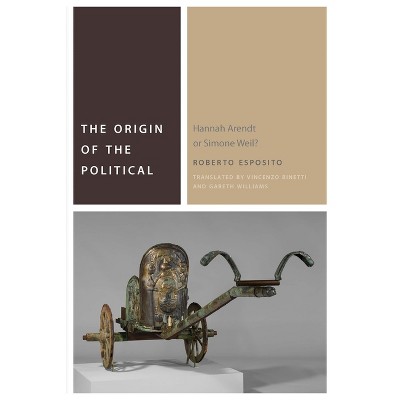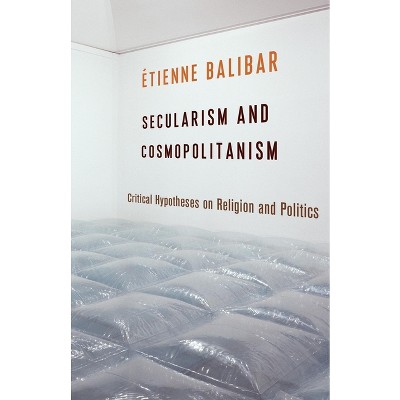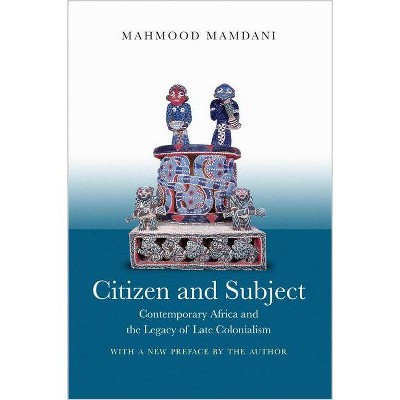Sponsored

Citizen Subject - (Commonalities) by Étienne Balibar (Paperback)
In Stock
Sponsored
About this item
Highlights
- What can the universals of political philosophy offer to those who experience "the living paradox of an inegalitarian construction of egalitarian citizenship"?
- About the Author: Étienne Balibar is Professor Emeritus of Moral and Political Philosophy at Université de Paris X-Nanterre; Distinguished Professor of Humanities at the University of California, Irvine; and Visiting Professor of French at Columbia University.
- 416 Pages
- Philosophy, Political
- Series Name: Commonalities
Description
About the Book
A collection of Essays over the last 20 years, exploring different dimensions (historical, political, philosophical, literary) of the philosophical debate on "subjecthood" and "subjectivity" in Modernity, as it was framed by the "Controversy on the subject" from the 1960's, and showing how it is now continued in a "controversy on the Universal".Book Synopsis
What can the universals of political philosophy offer to those who experience "the living paradox of an inegalitarian construction of egalitarian citizenship"? Citizen Subject is the summation of Étienne Balibar's career-long project to think the necessary and necessarily antagonistic relation between the categories of citizen and subject. In this magnum opus, the question of modernity is framed anew with special attention to the self-enunciation of the subject (in Descartes, Locke, Rousseau, and Derrida), the constitution of the community as "we" (in Hegel, Marx, and Tolstoy), and the aporia of the judgment of self and others (in Foucualt, Freud, Kelsen, and Blanchot).
After the "humanist controversy" that preoccupied twentieth-century philosophy, Citizen Subject proposes foundations for philosophical anthropology today, in terms of two contrary movements: the becoming-citizen of the subject and the becoming-subject of the citizen. The citizen-subject who is constituted in the claim to a "right to have rights" (Arendt) cannot exist without an underside that contests and defies it. He--or she, because Balibar is concerned throughout this volume with questions of sexual difference--figures not only the social relation but also the discontent or the uneasiness at the heart of this relation. The human can be instituted only if it betrays itself by upholding "anthropological differences" that impose normality and identity as conditions of belonging to the community. The violence of "civil" bourgeois universality, Balibar argues, is greater (and less legitimate, therefore less stable) than that of theological or cosmological universality. Right is thus founded on insubordination, and emancipation derives its force from otherness. Ultimately, Citizen Subject offers a revolutionary rewriting of the dialectic of universality and differences in the bourgeois epoch, revealing in the relationship between the common and the universal a political gap at the heart of the universal itself.Review Quotes
The appearance of this book in France was something of a historic event. Under the heading of 'universality, ' a concept that Balibar has almost single-handedly salvaged, Citizen Subject tries to rethink political belonging in our time, so as to redeem a humanism capable of contesting itself from the inside and available to serve the struggles of our day. Balibar rewrites a central tradition of Western philosophy from Descartes through Locke, Rousseau, Hegel, Marx, and Nietzsche, and from Wolstonecraft through Fanon, showing in case after brilliant case that the very writers most invoked as origins (or critics) of the subject had in fact been engaged in a common enterprise of thinking a social, nontranscendent self, the democratic citizen under the contradictory conditions of modernity. The result is one of the strongest, most ambitious, and most pertinent rewritings of the history of philosophy that readers are likely to encounter in their lifetimes.-----Bruce Robbins, Columbia University
About the Author
Étienne Balibar is Professor Emeritus of Moral and Political Philosophy at Université de Paris X-Nanterre; Distinguished Professor of Humanities at the University of California, Irvine; and Visiting Professor of French at Columbia University. His many books in English include Equaliberty: Political Essays; We, the People of Europe? Reflections on Transnational Citizenship; Politics and the Other Scene; and, with Louis Althusser, Reading Capital: The Complete Edition. Steven Miller is Associate Professor of English at the University at Buffalo, SUNY.

















